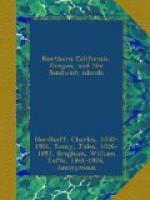The Pike in Mendocino County regards himself as a laboring-man, and in that capacity he has undertaken to drive out the Indians, just as a still lower class in San Francisco has undertaken to drive out the laboring Chinese. These Little Lake and Potter Valley Pikes were ruined by Indian cheap labor; so they got up a mob and expelled the Indians, and the result is that the work which these poor people formerly performed is now left undone.
As for the Indians, they are gathered at the Round Valley Reservation to the number of about twelve hundred, where they stand an excellent chance to lose such habits of industry and thrift as they had learned while supporting themselves. At least half the men on the reservation, the superintendent told me, are competent farmers, and many of the women are excellent and competent house-servants. No one disputes that while they supported themselves by useful industry in the valleys where were their homes they were peaceable and harmless, and that the whites stood in no danger from them. Why, then, should the United States Government forcibly make paupers of them? Why should this class of Indians be compelled to live on reservations?
Under the best management which we have ever had in the Indian Bureau—let us say under its present management—a reservation containing tame or peaceable Indians is only a pauper asylum and prison combined, a nuisance to the respectable farmers, whom it deprives of useful and necessary laborers, an injury to the morals of the community in whose midst it is placed, an injury to the Indian, whom it demoralizes, and a benefit only to the members of the Indian ring.
Round Valley is occupied in part by the Nome Cult Reservation, and in part by farmers and graziers. In the middle of the valley stands Covelo, one of the roughest little villages I have seen in California, the gathering-place for a rude population, which inhabits not only the valley, but the mountains within fifty miles around, and which rides into Covelo on mustang ponies whenever it gets out of whisky at home or wants a spree.
The bar-rooms of Covelo sell more strong drink in a day than any I have ever seen elsewhere; and the sheep-herder, the vaquero, the hunter, and the wandering rough, descending from their lonely mountain camps, make up as rude a crowd as one could find even in Nevada. Being almost without exception Americans, they are not quarrelsome in their cups. I was told, indeed, by an old resident, that shooting was formerly common, but it has gone out of fashion, mainly, perhaps, because most of the men are excellent shots, and the amusement was dangerous. At any rate, I saw not a single fight or disturbance, though I spent the Fourth of July at Covelo; and it was, on the whole, a surprisingly well-conducted crowd, in spite of a document which I picked up there, and whose directions were but too faithfully observed by a large majority of the transient population. This was called a “toddy time-table,” and I transcribe it here from a neat gilt-edged card for the warning and instruction of Eastern topers.




